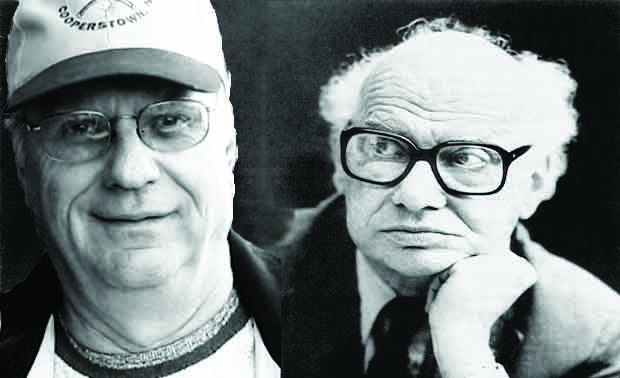My Father Knew Milton Babbitt
John Adams titled his work “My Father Knew Charles Ives” based on a hunch that had his father ever actually met the groundbreaking American composer, their similar dispositions and interests would have made them fast friends. This little anecdote differs from Adams’ in two points. First, my father, a lifelong athlete and track coach couldn’t be more different than the groudbreaking American modernist Milton Babbitt, one of the most significant American composers of the century. And second, it actually happened.
It was an autumn day in the early 90s and I was working towards my undergraduate degree from Princeton University. My father had driven down from New York to watch a Princeton football game with me. This was something of a running theme in my life; as a toddler my father would take me to the football games at the high school where he was the director of athletics. The only part I would pay attention to was the marching band. When they weren’t on the field, I went back to trying to figure out how the scoreboard worked.
After the Princeton game, we took a walk around campus. Although I was in the engineering school, just about every elective I took was in the music department, so we swung by the Woolworth music building to take a look around. As soon as we stepped into the atrium, I recognized Milton Babbitt walking right towards us.
At this time, Professor Babbitt was emeritus and sightings were rare. I had introduced myself a year earlier, and there was a chance that he might recognize me from a recent performance as the Baker in Into The Woods on campus (the only time I got nervous after recognizing someone in the audience. As soon as I got offstage I breathlessly told my castmates that none other than Milton Babbitt was in the audience only to receive blank stares. “The father of American serialism!” Still nothing. “Stephen Sondheim himself studied with him!” Well, that got some response.) I took a deep breath and approached the modern master.
The good professor was gracious. In all probability he had no idea who I was, but he didn’t show it for a second. He was warm, friendly, and unassuming, not one bit the antagonistic arch intellectual you’d expect from the title of his infamous article “Who Cares If You Listen?” (A title he wasn’t responsible for.)
And then I found myself saying one of the more surreal sentences I’ve ever spoken. “Professor Babbitt, this is my dad.”
I don’t mean to give the impression that my father was without culture. Though an unapologetic jock, he had a formidable collection of classical and opera CDs as well as every playbill from every broadway show he had ever seen. But his tastes have always leaned heavily towards the the greatest hits of the classical world. While an avid consumer of books, music, television, and culture in general, my father’s taste would never be described as ‘discerning’. What could he possibly have to say to the third musician to ever receive a MacArthur genius grant?
The older men shook hands and I dreaded the awkward pauses that were sure to follow. But Professor Babbitt’s face immediately lit up. “That’s an old Brooklyn Dodgers cap!” Of course it was. The lower floor of our house was entirely decorated with Brooklyn Dodgers memorabilia. “Yeah! You a Dodgers fan?” “Sure am, were you there in ’55?” “Game 7! That Johnny Podres shutout!”
For a good 10 or 15 minutes they reminisced about their favorite players and games, obscure statistics, physics defying defensive plays as I stood there, an astonished third wheel. They were speaking a language I knew only fleetingly and I wasn’t about to foul things up with a pitch in the dirt.
After conversation had run out, enthusiastic handshakes and “great meeting you”s, Professor Babbitt happily went along his way.
“Dad, do you have any idea who that was?”
“One of your teachers, right?”
“Dad, he’s one of the most important composers alive.”
“No kidding! What did he write?”
“I don’t think you’ve heard any of it.”
“Well. Nice guy. I’ll have to get one of his albums.”
“Yeah. Let me know what you think…”
I’m pretty confident that somewhere in my father’s CD collection, tucked between Leroy Anderson’s greatest hits and Berlioz Symphony Fantastique is a lone Milton Babbitt CD. It’s not in heavy rotation, but it’s there.
